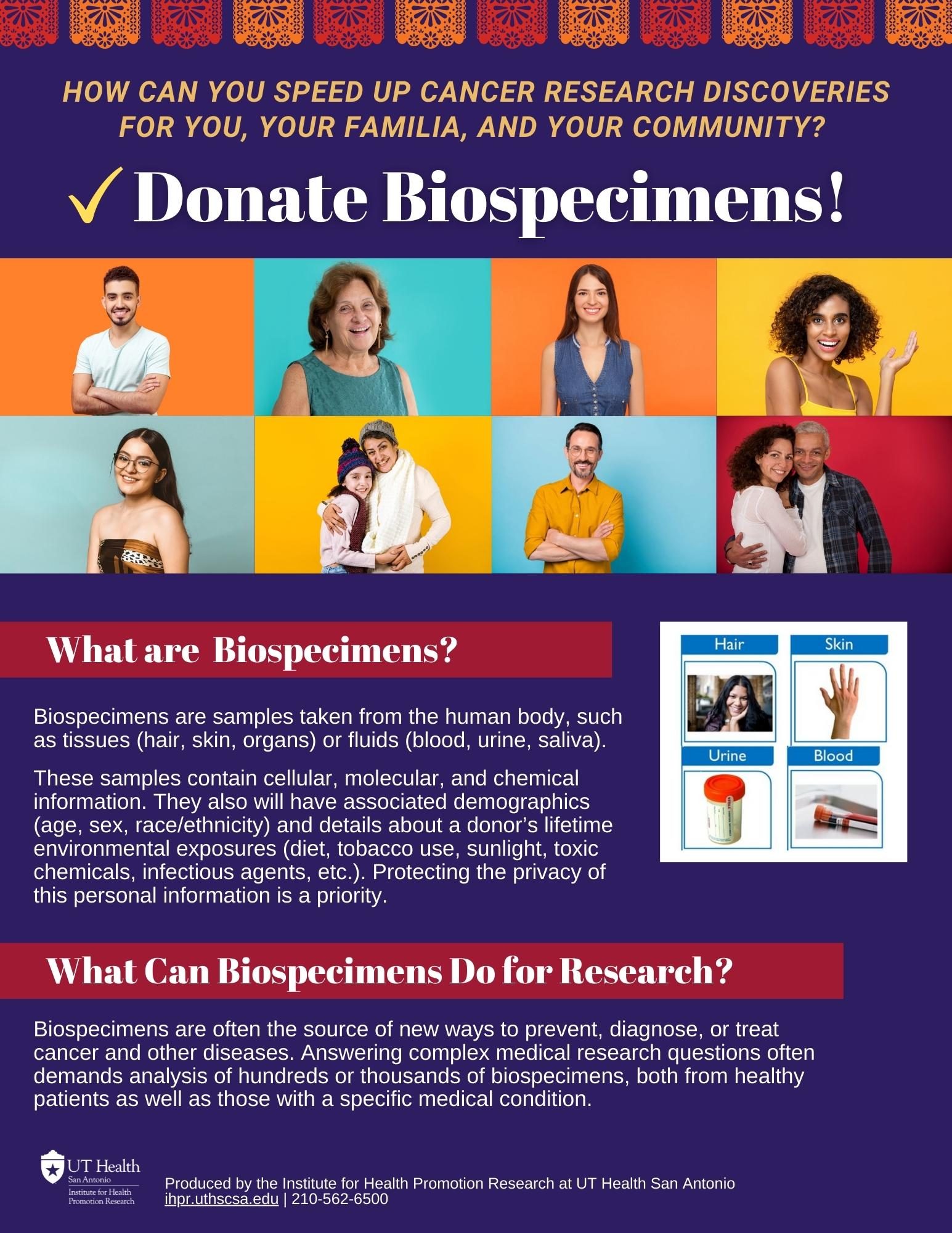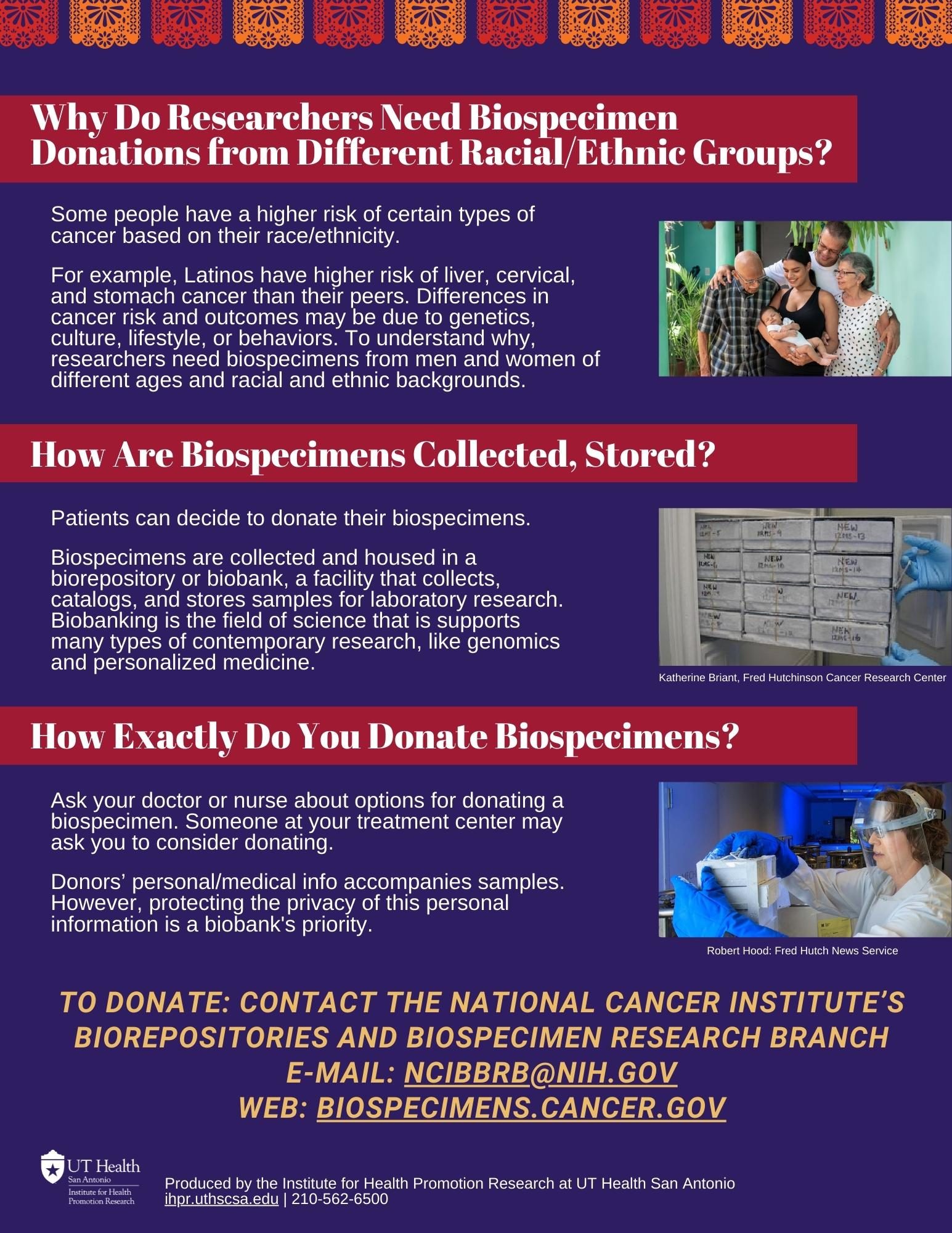
You Can Donate Biospecimens for Research to Fight Cancer, Alzheimer’s!
Ever heard of donating biospecimens for research?
When a person donates biospecimens—blood, fluid, or tissue samples—it gives researchers the opportunity to better understand, treat, and prevent medical conditions from cancer to Alzheimer’s.
Biospecimens are especially needed from Latinos, who suffer health disparities.
“Latinos who donate biospecimens are heroes. Their contributions enable researchers to make medical discoveries and build new therapies to help millions of Latinos across the nation,” said Dr. Amelie G. Ramirez, leader of the Salud America! Latino health equity program at the Institute for Health Promotion Research in the Department of Population Health Sciences at UT Health San Antonio.
What are Biospecimens?
Biospecimens are materials from the human body.
They are sometimes called “samples,” and include:
- Tissues: hair, skin, or organs
- Fluids: blood, urine, or saliva
These samples contain cellular, molecular, and chemical information.
Along with the samples, biospecimens are stored with personal and medical information (age, sex, race/ethnicity). The information also has details about a donor’s lifetime environmental exposures (diet, tobacco use, sunlight, toxic chemicals, infectious agents, etc.).
What Can Biospecimen Donation Do for Research?
Biospecimens are often the source of new ways to prevent, diagnose, or treat cancer and other diseases.
For example, researchers study biospecimens to find biomarkers.
A biomarker is a molecule—mainly DNA, proteins, hormones—found in biospecimens that may indicate normal or abnormal process taking place in your body.

Researchers use biomarkers to predict disease risk. They also use biomarkers to screen and diagnose disease, monitor disease progression, and examine the body’s response to a treatment.
Biomarkers exist for cancer, heart disease, and other diseases.
“Biomarkers provide a dynamic and powerful approach to understanding the spectrum of diseases with applications in observational and analytic epidemiology, randomized clinical trials, screening and diagnosis, and prognosis,” according to Gertrude H. Sergievsky of Columbia University. “Biomarkers use in research has grown out of the need to have a more direct measurement of exposures in the causal pathway of disease that is free from recall bias, and that can also have the potential of providing information on the absorption and metabolism of the exposures.”
Researchers can’t make breakthroughs without biomarkers and biospecimens.
“Answering complex medical research questions often demands analysis of hundreds or thousands of patient biospecimens, both from healthy patients as well as those with specific medical conditions,” according to ispecimen.com.
Why Do Researchers Need Biospecimen Donations from Different Racial/Ethnic Groups?
Some people have a higher risk of certain types of diseases based on their race/ethnicity.

For example, Latinos have higher risk of liver, cervical, stomach, and rare cancers than their peers. Latinos have lower risk for other cancer types, like breast, but worse outcomes. Latinos overall are 1.5 times more likely to develop Alzheimer’s than their White peers.
Differences in risk and outcomes may be due to genetics, culture, lifestyle, or behaviors.
“To understand why, researchers need samples [biospecimens] from men and women of different ages and different racial and ethnic backgrounds,” according to cancer.net.
Why Do Researchers Need Biospecimen Donations from Latinos?
Latinos comprise 18.5% of the U.S. population.
However, they only make up 1% of those participating in National Institutes of Health clinical trials, according to a recent report. Overall, Latinos make up between 6-7% of participants in clinical trials.
There is a historical lack of targeted research about Latino health inequities.
Lack of knowledge or awareness, fear of side effects, and mistrust or fear of being experimented are some of the main barriers for low Latino participation in clinical trials or donating biospecimens.
“Biospecimens donated by Latinos can help researchers find biomarkers and develop new treatments for this unique population, which suffers a heavy burden of certain cancers, dementia, obesity, and mental health issues,” Ramirez said.
How Are Biospecimens Collected, Stored?
Patients can decide to donate their biospecimens.
Biospecimens are collected and housed in a biorepository or biobank, a facility that collects, catalogs, and stores samples for laboratory research. Biobanking is the field of science that is supports many types of contemporary research, like genomics and personalized medicine.
Donors’ personal/medical info accompanies samples.
However, protecting the privacy of this personal information is a biobank’s priority.
“Research that involves biospecimens has to follow strict guidelines. Further, the research is reviewed by an institutional review board (IRB). The IRB protects the health, safety, and well-being of people who join research studies. Only researchers who have research studies approved by the IRB can get biospecimens,” according to cancer.net.
Why Should You Donate Biospecimens?
Here are a few examples of life-saving therapies and diagnostics created through the generous donation of biospecimens from patients, according to according to ispecimen.com:
- Herception® for breast cancer
- Gleevec® for gastrointestinal stromal tumors
- Erbitux® for colorectal cancer
- Iressa® for non-small-cell lung cancer
- Zelboraf® for melanoma
- Biomarkers for Type 2 Diabetes and Rheumatoid Arthritis
“Patients cite a range of reasons for contributing their biospecimens. In one study of tissue donors, 90% cited altruistic reasons including, ‘you’re contributing,’ it’s a ‘good cause,’ the hope that researchers might ‘find a cure,’ and ‘it feels good to help,’” according to ispecimen.com.
How Exactly Do You Donate Biospecimens?
Ask your doctor or nurse about options for donating a biospecimen.
Someone at your treatment center may ask you to consider donating.
 “Either way, always feel free to ask questions. Getting the answers will give you confidence about your decision whether to donate,” according to cancer.net. “A consent form helps you decide whether to donate a sample or participate in a study. It tells you what you would be contributing to the study. And, it tells you the goals of the study. Someone on the health care team will explain the consent form and answer your questions.”
“Either way, always feel free to ask questions. Getting the answers will give you confidence about your decision whether to donate,” according to cancer.net. “A consent form helps you decide whether to donate a sample or participate in a study. It tells you what you would be contributing to the study. And, it tells you the goals of the study. Someone on the health care team will explain the consent form and answer your questions.”
Find out more about biospecimen donation at the National Cancer Institute’s Biorepositories and Biospecimen Research Branch. E-mail them at ncibbrb@nih.gov.
You can also share our biospecimen donation fact sheets in English or Spanish.
If you are in San Antonio or Miami, you can participate in the Avanzando Caminos study!
Our study, teaming researchers at the Mays Cancer Center at UT Health San Antonio and the Sylvester Comprehensive Cancer Center at the University of Miami, aims to unpack the social, cultural, behavioral, biological, and medical influences on post-cancer life in Latino cancer survivors.
Visits include blood draws—a biospecimen—and assessment questionnaires. Volunteers are eligible for $50 per visit!
“With the help of Latino cancer survivors, we can help future Latino cancer survivors heal, recover, and reduce the chance for cancer to come back,” said Ramirez.
To volunteer for the Avanzando Caminos study or ask questions, contact Fernando Juarez, project coordinator on Dr. Amelie Ramirez’s team at the Institute for Health Promotion Research at UT Health San Antonio, at 210-562-6514 or caminos@uthscsa.edu. Volunteers are eligible for $50 per visit!
The post You Can Donate Biospecimens for Research to Fight Cancer, Alzheimer’s! appeared first on Salud America.

